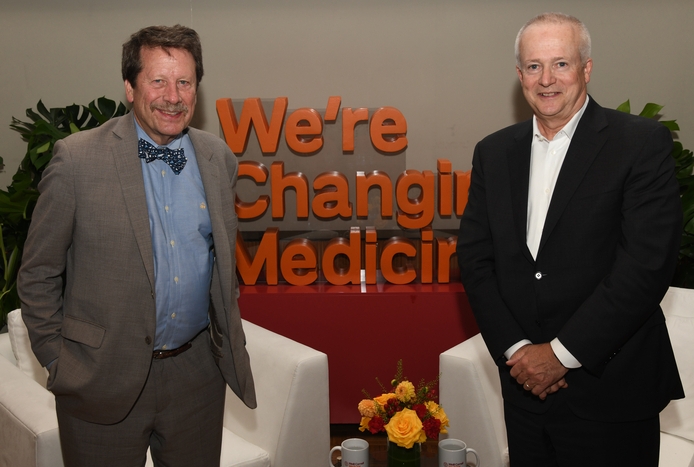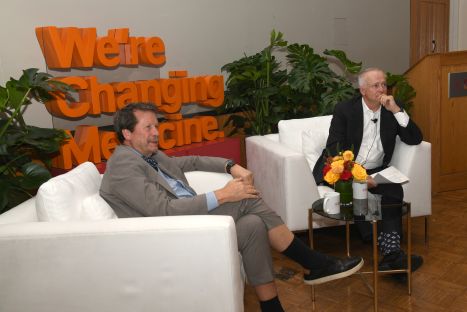
Health care in the United States is at a crossroads, said U.S. Food and Drug Administration Commissioner Dr. Robert M. Califf, in large part due to a confluence of post-COVID disinformation, rising cardiovascular mortality rates, a heavier burden of chronic diseases and decreased life expectancy.
New York state however stands out as a bright spot. The state’s success is one of the reasons that brought Dr. Califf to sit down with Dr. Robert A. Harrington, the Stephen and Suzanne Weiss Dean of Weill Cornell Medicine, on Oct. 15 to discuss what researchers, regulators and clinicians can do to improve health care outcomes for all Americans.
“The U.S. is leading the world in innovation, creating new products, new ways of doing things, but we are almost in last place among high-income countries in terms of application of all that know-how — in technology, in human health. We're essentially in last place and continuing to lose ground,” Dr. Califf said. “I had hoped I would come to New York and learn what the magic ingredient is.”
The discussion, the academic year’s first Dean’s Distinguished Lecture Series event, focused on the various challenges and factors that affect health care outcomes in New York and the United States as a whole. In a wide-ranging discussion that touched on everything from data use to balancing innovation with regulatory issues to disinformation, Dr. Harrington and Dr. Califf explored many topics that have the potential to improve American health.

Drs. Robert M. Califf, left, and Robert A. Harrington during a fireside chat Oct. 15.
The hour-long chat was part of Dr. Califf’s two-day visit to Cornell. On Oct. 15, Dr. Califf met in New York City with Weill Cornell Medicine students, clinicians and researchers to learn from their work and experiences. He then traveled upstate to spend the following day at Cornell’s Ithaca campus to speak with food scientists, veterinarians and others.
During a fireside chat in Ithaca, moderated by Dr. Krystyn J. Van Vliet, vice president for research and innovation at Cornell, Dr. Califf urged the scientists of tomorrow to attempt hard things in the face of urgent need, especially in the realm of Americans’ faltering health and well-being.
“Important things happen when people have the courage to do things differently,” he said. “How can it be that the U.S. spent $4.8 trillion on health care in 2023? It’s not being spent on the right things.”
Balancing Innovation with Regulation
Although the FDA regulates products — not practice, people or advertising — much of the discussion centered around the intersection of these topics and how medicine is truly dependent on human decisions. What became clear was that, in many cases, the way medicine is being practiced in the U.S. may not be the best way to go about doing things.
“I do think there’s going to be a need, and we would all benefit from a rethinking of primary care in the American context,” he said, noting that technology is changing clinical care and these advancements present an opportunity to reconsider how to train new primary care practitioners. “It’s a great time for deans of prominent medical schools to think about this.”
Dr. Califf noted that 90 percent of the clinical trials the FDA oversees are small and designed to determine if a drug is toxic. For a drug to come to market, it simply needs to demonstrate benefits that outweigh the risks for a single indication in a single population. This methodology ignores countless other variables, Dr. Califf said, which requires significant changes in process and protocols.
“Which treatment is best? How do you combine them? How long should you give it? Is the dose really the best?” he said, questions that demonstrate the importance of pragmatic trials. “Because you don't have to have the best dose, you just have to have a dose which meets the criteria: safe and effective. And of course, none of the value or cost questions are answered at that point.”
Going forward, clinicians, researchers and regulators will need to figure out better ways to incorporate research into practice and use aggregated data to take better care of populations. There is so much data that’s simply being ignored, and the data that is being considered is typically done so within a vacuum, which must change, Dr. Califf said. More clinicians must be trained to interpret and work with data as part of their practices and research, Dr. Harrington added.
“It's now no longer a dream that we can have an information technology infrastructure that's a constant churn of information about health outcomes and products and how they interact with each other,” Dr. Califf said. “We should be looking at it all the time, just the same way that you monitor a patient in the intensive care unit.”
Using such observational, real-world data has the potential to create real change since it is much less expensive and could be used to answer questions in real time.
“All across this country fragmentation is a huge problem, and the financialization of the system so that data is regarded as a financial asset rather than a means of enabling people to achieve the best health. That's a big problem,” he said.
In addition, there must be a way to balance the need for rapid growth while continuing to ensure the ongoing safety of technologies, he said. Involved organizations will also need to work more closely together and break down silos between regulatory bodies, medical professionals and even campuses within the same organization, such as Cornell.
The fireside chat concluded with a question about misinformation — imparting incorrect information with no malintent — and disinformation, which is purposely promoting bad information to harm or take advantage of others.
“We’re seeing a rising tide of both and we’re losing the battle right now for the most part,” he said.
Dr. Califf drove home this point by explaining that more than 230,000 Americans may have survived COVID-19 had they been vaccinated. By believing the misinformation they were fed they put themselves and others at risk.
Misinformation and disinformation are also behind a decline in people getting routine vaccinations, as well as understanding the utility of herbal medicines and supplements.
“The way out of these things is to assume a rational world, which is not always the case,” Dr. Califf said, “but generate the evidence, and based on the evidence, make decisions.”
Laura Reiley, a writer for the Cornell Chronicle, contributed to this story.

